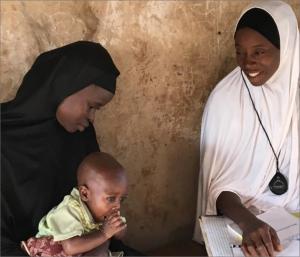Ministry of Health, WHO experts highlight results of life-saving programme for children under five.
Abuja, 23 October 2017-Together, Nigeria and the Democratic Republic of Congo account for over 40 per cent of the global malaria illnesses and deaths. Children under the age of five are particularly vulnerable. Malaria, pneumonia and diarrhoea, which are preventable and curable, are responsible for about one third of child deaths.
The Rapid Access Expansion (RAcE) Programme has been saving children’s lives through an innovative programme in Nigeria, Niger, Mozambique, Malawi and DRC since it began in 2013. Over 7.1 million cases of these illnesses have been treated, including 1.25 million cases in Abia and Niger States in Nigeria. Through the integrated Community Case Management (iCCM) strategy, community health workers in hard to reach areas are trained to diagnose and treat uncomplicated cases of malaria, pneumonia and diarrhoea and refer children with signs of serious illness. The workers are provided with supplies and medicines, and supervised by health facility staff and district managers.
Dr Matshidiso Moeti, Regional Director for Africa, says, “At the World Health Organization, we believe that all people have a basic human right to access health services. This requires us to find new ways to reach those who are most vulnerable. Through the RAcE Programme activities in five African countries, we have evidence that iCCM is effective in providing primary care services for treatable illnesses in children under five.”
From 24-27 October, Professor Isaac Adewole, Nigeria’s Minister of Health will lead the RAcE Multi-Country Dissemination Meeting at the Transcorp Hilton in Abuja. Over 120 national and international public health experts, from five countries will join the World Health Organization, iCCM experts, and child health advocates to share the evidence generated by RAcE and to help countries to scale up high-quality national iCCM programmes. Participants will discuss programme achievements, operational research and evaluation results. A key focus of the will be the sustainability roadmaps that provide a pathway to extend the successes of the iCCM pilot programme.
“Communities are at the heart of iCCM,” says Dr Wondimagegnehu Alemu, WHO Country Representative to Nigeria. “Through the Ministry of Health, community health workers bring life-saving health services into remote areas”, he added.
In some RAcE implementing areas, reports indicate that morbidity of children under the age of five has reduced drastically since the project was initiated. The global under-five mortality rate has also dropped by 53% since 2000. However, in 2016 alone, 2.65 million children died in Africa. Led by ministries of health, the WHO-recommended iCCM strategy leverages community members and local governments to contribute to the Sustainable Development Goals, particularly SDG 3, which focuses on ensuring healthy lives and promoting well-being for all, at all ages.
“With support from government at all levels and active engagement from communities, we can protect and save children from preventable deaths,” says Dr Salim Sadruddin, a WHO public health expert who leads the RAcE Programme.
For more information:
Dr Salim Sadruddin, Team Leader, RAcE WHO Global Malaria Programme
Tel: +41 22 791 4743 | Email: sadruddins [at] who.int (sadruddins[at]who[dot]int)
Catherine Kane, Information Manager, RAcE WHO Global Malaria Programme
Tel: +41 79 249 3534 | Email: ckane [at] who.int (ckane[at]who[dot]int)



